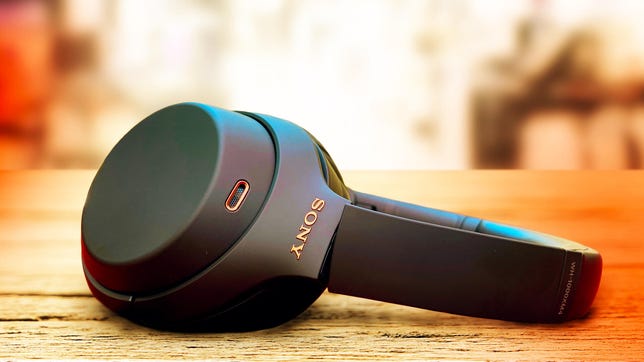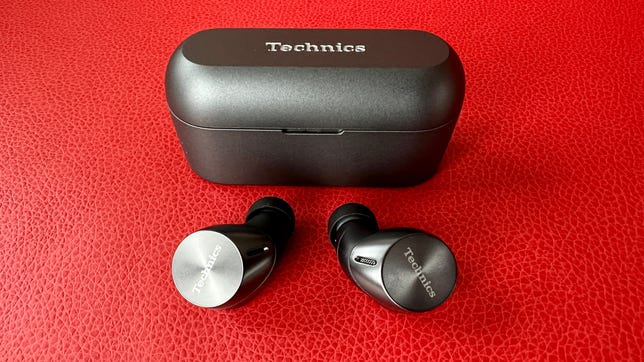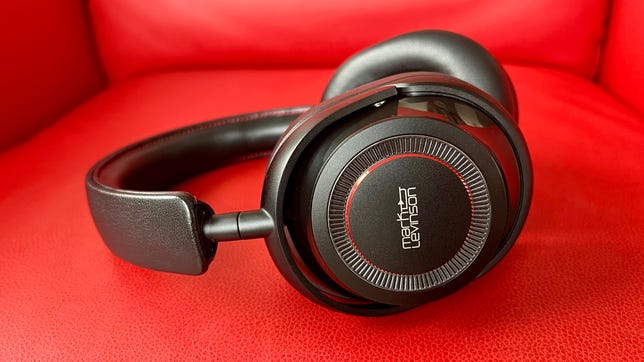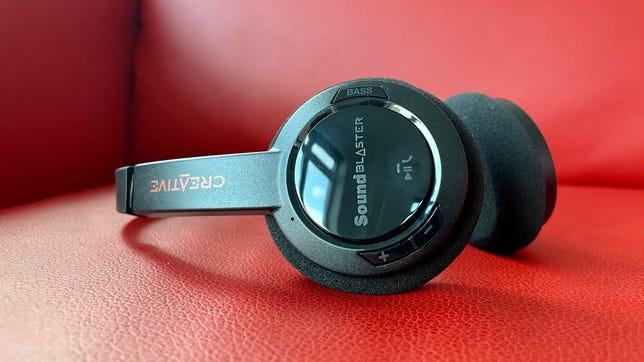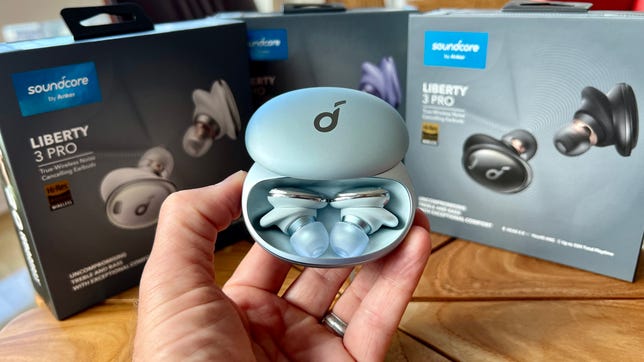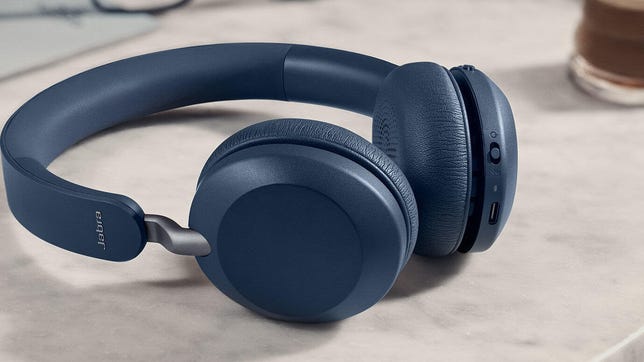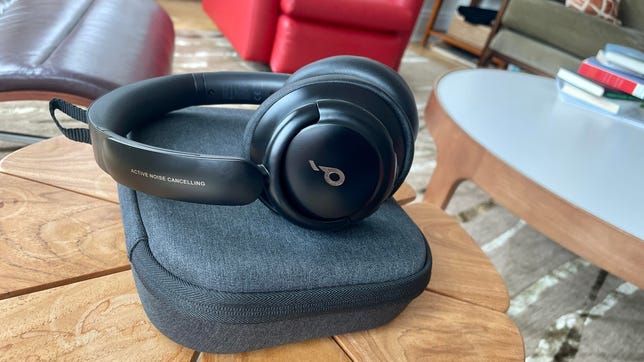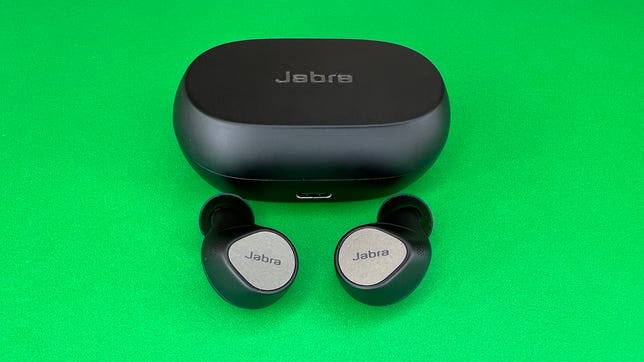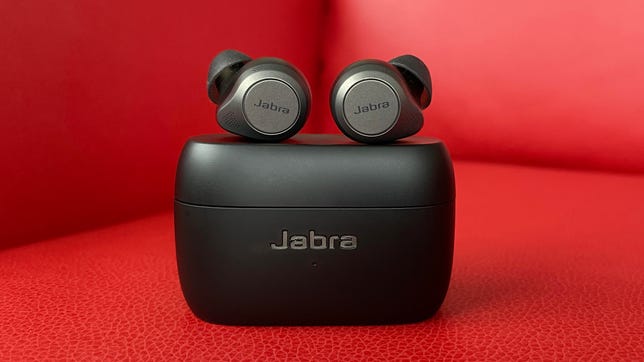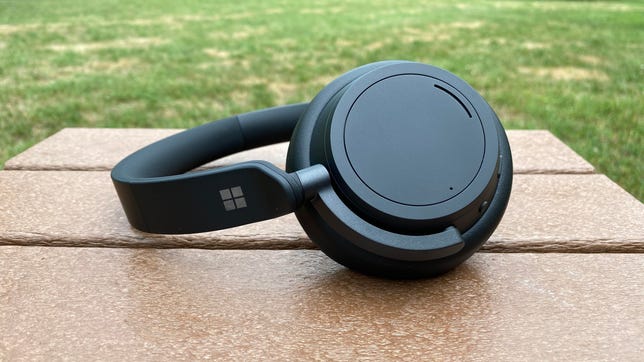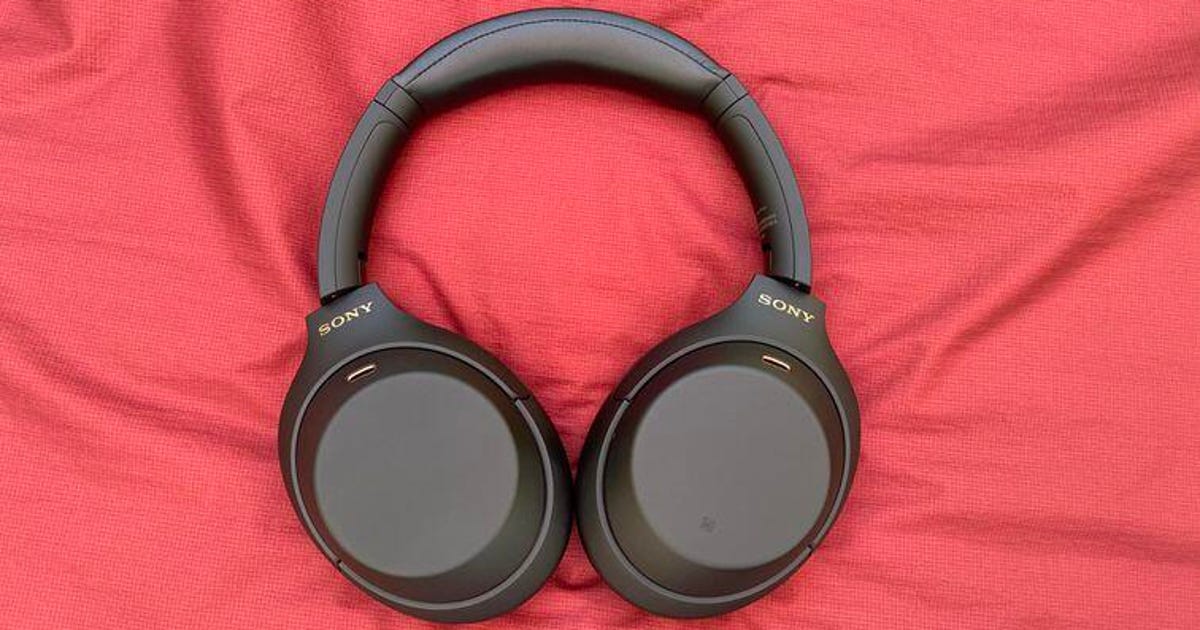
With more and more devices removing headphone jacks, Bluetooth headphones have become even more ubiquitous in recent years. However, the key feature of a great pair of Bluetooth headphones is the ability to connect the cans to two different devices at the same time. This allows people to do things like play video games, watch movies or perform other tasks, while also monitoring their phone in case of an urgent call — or maybe they just want to listen to music in addition to their other activity.
Multipoint Bluetooth pairing shouldn’t be confused with multiconnection Bluetooth, which allows you to pair several devices (often up to seven or eight) to your headphones and have the headphones remember the device for easy repairing. However, without true multipoint Bluetooth pairing, a given pair of headphones can only be actively paired to one device at a time — you have to manually switch over to another device if you want to access that as the audio source.
Apple and Samsung offer a variation of multipoint Bluetooth pairing called “automatic switching,” which only works for their respective devices. For instance, you can have your AirPods Pro connected to your iPhone and Mac simultaneously (and an iPad) but a non-Apple device can’t be in the mix for simultaneous pairing. Samsung’s various Galaxy Buds have a similar arrangement with Galaxy smartphones and tablets.
In the past, business-focused headphones — some of which featured integrated boom microphones — offered advanced multipoint Bluetooth pairing. But the feature has gradually come to more consumer headphones, which are what we’re focusing on here. (We also have a list of Best Headphones for Working From Home that includes some of those more business-class headsets with boom mics and USB dongles for reliable wireless PC connectivity.) Unfortunately, multipoint Bluetooth pairing isn’t easy to implement at all, let alone implement reliably, particularly with true-wireless earbuds.
“Up until recently, Bluetooth chips supported a maximum of two simultaneous connections,” explains Jonathan Levine, CEO and founder of Master & Dynamic. “This makes multipoint easy for headphones, where a wire connects both ear cups. However, for a true wireless product, one of the two connections gets consumed by the other earphone — leaving only one available connection to an audio source. Cutting-edge connectivity protocols have allowed true wireless products to connect much more seamlessly and bypass the maximum limit of two connections.”
Still, some companies like Master & Dynamic and Jabra, which have been early adopters of the latest Qualcomm SoCs (systems on a chip), added multipoint — and sometimes other features — via a firmware upgrade long after their new earbuds have launched. The Jabra Elite 7 Pro has finally been upgraded with multipoint Bluetooth and Master & Dynamic’s MW08 and MW08 Sport should get the feature soon. Both companies use Qualcomm chips.
That said, enough headphones now support multipoint that we’ve pulled our favorites together here. Note that this list does not include the aforementioned Apple and Samsung headphones, as their respective automatic switching only works within their own branded ecosystem.
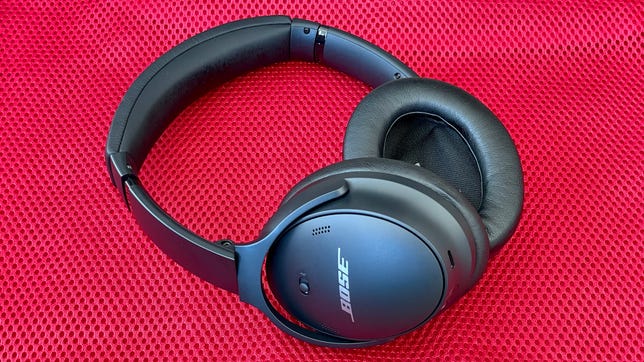
David Carnoy/CNET
Bose QuietComfort 45
Latest Bose
The QuietComfort 45 has virtually the same design as its predecessor, the QuietComfort QC35 II, which many people considered one of the most comfortable over-ear headphones — if not the most comfortable. It has the same drivers, according to Bose, and the buttons are in the same place. However, there are small but notable changes. First off, these thankfully have USB-C instead of micro-USB.
Secondly, the microphone configuration is different. Not only have the mics been shifted on the headphones, but there’s now an extra external microphone for voice pick-up, which means the QC45 has a total of six microphones, four of which are beamforming and used for voice. By contrast, the QC35 II has a total of four, two of which are used for voice. (The Bose Noise Canceling Headphones 700 also have six microphones total.)
These headphones are excellent for making calls. They’re similar to the Bose Headphones 700 in that regard. They also include top-notch noise canceling and multipoint Bluetooth pairing, so you can connect them with a PC and your phone simultaneously. Read our full review of the QuietComfort 45.
David Carnoy/CNET
When Sony released the WH-1000XM4 in 2020, it highlighted a couple of key improvements beyond slightly better sound and noise cancellation. The headphone not only offers better voice-calling performance but it adds multipoint Bluetooth pairing so you can connect to two devices — such as your phone and PC — at the same time. That means that if a call comes in while you’re using the headphones with your computer the audio will switch to your phone when you answer the call.
The Bose Noise Cancelling Headphones 700 probably still have a slight edge for voice calls, but the 1000XM4 is arguably a tad more comfortable and also has some other slight improvements to its noise canceling and sound that makes it a great all-around choice for working from home.
You’re receiving price alerts for Sony WH-1000XM4 (Black)
David Carnoy/CNET
Panasonic’s Technics EAH-AZ60 buds don’t have quite as premium a feel as the earlier EAH-AZ70W, but they sound sweet with clean, well-balanced sound, well-defined bass and good detail. They feature active noise canceling (it’s good), a transparency mode, multipoint Bluetooth pairing so you can connect to your computer and phone at the same time and it has very solid voice-calling performance with good noise reduction. The buds are IPX4 splash-proof and are rated for up to 7 hours of battery life on a single charge at moderate volume levels.
They’re missing a couple of features usually found at this price point: Namely, an ear-detection sensor that automatically pauses your music when you pull the earbuds out of your ears, and wireless charging (the former feature is more important). The step-down EAH-AZ40 also sound good but the EAH-AZ60 not only have larger drivers (8mm compared to 6mm), but they support Sony’s LDAC audio codec and have two additional microphones for voice calling and noise canceling (the EAH-AZ40 doesn’t have noise canceling).
David Carnoy/CNET
The No. 5909 are premium audio brand Mark Levinson’s first headphones. Yes, they’re expensive at $999 and probably a wee bit overpriced, but they’re excellent. They have a sturdy design without managing to feel hefty on your head (read: they’re substantial but not too heavy) and they’re comfortable to wear over long periods thanks to their nicely padded (and replaceable) leather-covered earcups and headband.
Not only do they have good noise canceling and excellent sound, but their voice-calling performance is top-notch, making them one of the best noise canceling headphones options on the market. Plus, they have multipoint Bluetooth pairing so you can pair them with two devices, such as a computer and a phone, simultaneously.
The No. 5909 are high-res certified with support for Sony’s LDAC and Qualcomm’s aptX Adaptive codecs that allow for near-lossless streaming over Bluetooth. Apple’s iPhones and iPads don’t support those codecs while certain Android devices do. Using the No. 5909 headphones over Bluetooth on my iPhone 13 Pro, it sounded a tad more natural and refined than the AirPods Max (the No. 5909 had a touch more “pure” and accurate sound).
I did notice a difference when I paired the No. 5909 to my Google Pixel 4 XL, which has support for LDAC, and using the Qobuz audio streaming service that offers high-res streaming. Overall, the sound had a little more depth and texture, and there’s a touch more sparkle, definition and openness.
David Carnoy/CNET
I was a fan of Creative’s original Sound Blaster Jam headphones that came out in 2015 and had a decidedly retro look and feel, with good sound for the money. Now they’re available in a 2.0 version that has some key upgrades, including Bluetooth 5.0, USB-C charging, improved call quality and multipoint Bluetooth pairing that allows you to pair it to two devices simultaneously. Battery life is rated at up to 22 hours.
I was able to pair this wireless headphone set with a Mac Mini and an iPhone 12 Pro and then switch audio between them. Often when pairing Bluetooth headphones with Mac and Windows PCs, one can encounter some issues, but once I got the headphones paired with both my PC and phone, they made a good pair of work-from-home headphones. Also, the price is right for parents looking for a decent set of kids’ headphones for remote learning and everyday use.
Comfortable for on-ear headphones, the Jam V2s are lightweight and have nicely balanced sound with good detail and bass that’s ample but not overpowering. Call quality was good in my tests with callers saying they could hear me well even on the noisy streets of New York. No carry pouch is included, but you do get an extra set of foam ear pads, which is good, because they will wear out over time.
The headphones have physical buttons for controlling volume and playback, and there’s aptX support for devices that support the wireless streaming codec.
David Carnoy/CNET
Anker makes several earbuds that cost less than $100. But its Soundcore Liberty Pro is its “high-end” model that features premium sound, as well as support for Sony’s LDAC audio codec with compatible devices (mostly Android phones).
Available in four colors, the third-gen Liberty 3 Pro buds have updated dual drivers and are about 30% smaller than their predecessor. They fit my ears significantly better than the Liberty 2 Pro earbuds, which I didn’t love as much as some people. This new version is improved and a good value compared to other so-called premium buds.
The Liberty 3 Pro deliver a solid noise-canceling experience (they also have three different transparency modes) and feature Anker’s HearID ANC that “analyzes your ears and level of in-ear pressure to create a tailored profile that optimizes noise reduction and reduces external sound to suit your ears.”
The earbuds also perform well — though not exceptionally — as a headset for making calls and feature multipoint Bluetooth pairing. They’re IPX4 splash-proof and deliver up to 6 hours of battery life with noise canceling on and up to 8 hours with it off. The case charges wirelessly, and I liked how the tips of the buds are illuminated by a pair of LEDs on the inside of the case when the buds are charging.
You’re receiving price alerts for Soundcore Liberty Pro 3
Jabra
Released in mid-2020, the Jabra Elite 45h were essentially billed as the best on-ear headphones for the money. While there’s nothing fancy about them, they’re among the best value on-ear headphones right now, with good sound quality, a sturdy design and comfortable fit — for on-ear headphones, anyway. They perform well as a headset for making calls too, and include a sidetone feature that allows you to hear your voice so you don’t talk too loudly. Battery life is also good and it has multipoint Bluetooth pairing so you can connect to your computer and your phone at the same time, and easily switch between the two should a call come in on your phone. It mostly works.
Note that the $250 Evolve2 65, which has an integrated boom microphone, is essentially the souped-up office version of these headphones.
Amazon
As far as sound, comfort level and build quality, you’d be hard-pressed to do better than Anker’s SoundCore Life Q30 for the money. It doesn’t quite have the clarity or bass definition as some of the top premium models, but it’s less than a third of the price and gets you about 75% of the way there in terms of sound (it’s well balanced overall with punchy bass and there’s an app that allows you to tweak the sound). Noise canceling is good for the price, though not up to the level of the Sony WH-1000XM4 or Bose Noise Cancelling Headphones 700. Battery life is rated at an impressive 40 hours with USB-C charging.
The only area where the Q30 falls a little short is for voice calls. It picks up your voice fine in quieter environments but it just doesn’t reduce background noise all that well. However, it does offer multipoint Bluetooth pairing and is a solid value overall.
You’re receiving price alerts for Anker Soundcore Life Q30 (Black)
Jabra
Coming in at 16% smaller than the Elite 75t, the Elite 7 Pro are Jabra’s top-of-the-line earbuds in its new range and include the company’s new MultiSensor Voice technology with a bone-conduction sensor, four microphones and intelligent algorithms to deliver new “ground-breaking call quality,” Jabra says. The voice calling performance doesn’t quite live up to the hype, but Jabra has updated the buds’ firmware and added multipoint Bluetooth pairing and other small improvements.
These have adjustable active noise cancellation, Jabra’s HearThrough transparency mode and Bluetooth 5.2. They offer up to nine hours’ play time at moderate volume levels with noise canceling on, and nearly three additional charges in the charging case — total battery life is rated at 35 hours. The charging case has wireless charging capabilities.
The earbuds’ IP57 rating means they are dust-resistant and fully waterproof (they can be submerged in up to 1 meter of water). For those who like to use only a single bud, you can also use either bud independently in a mono mode.
Shokz
AfterShokz has changed its name to Shokz and released new ninth-gen bone-conduction headphones that offer improved bass performance compared to the company’s earlier flagship model, the Aeropex (now called the Shokz OpenRun). That makes the OpenRun Pro the best bone-conduction headphones you can get right now, although they still can’t match the sound quality of traditional headphones.
Bone-conduction wireless headphones don’t go on your ears — they actually deliver sound through your cheekbones. The big benefit of this technology as a safety feature for running is that, thanks to its open design, you can hear what’s going on around you — traffic noise in particular — while listening to music or having a phone conversation (yes, they perform well for voice calls). Also, some race coordinators don’t allow runners to wear anything in their ears, which is where headphones like this come in handy.
They do offer fuller sound with more bass, but it’s an incremental improvement, not a huge leap forward. Like other bone-conduction headphones these are strongest in the midrange where voices live so they’re best for podcasts, talk radio, newscasts and audiobooks. They’re also good for making calls and, like other Shokz models, have multipoint Bluetooth pairing.
Shokz also makes other more affordable models as well. The OpenComm, which integrates a boom microphone, also has multipoint Bluetooth pairing.
While Jabra’s Elite 75t series has been out a while, they’re still one of the better true wireless earbuds out there and have added noise canceling via a firmware upgrade. Earlier firmware updates improved voice-calling performance. These buds were also among the first to offer multipoint Bluetooth pairing and use different wireless technology from Jabra’s latest buds.
The Elite 75t isn’t quite as comfortable to wear as the AirPods Pro, but they arguably sound a touch better, with clearer overall sound and slightly better bass definition, so long as you get a tight seal. (The step-up 85t have more powerful bass.)
With the arrival of Jabra’s new line of wireless earbuds that includes the Elite 3, Elite 4, Elite 7 Active and Elite 7 Pro, we’re seeing nice discounts on the Elite 75t. Even though it’s an older model, it remains a good value at around $100 and sometimes costs less. Alas, Jabra’s latest buds, while good, don’t offer any major improvements.
You’re receiving price alerts for Jabra Elite 75t (Titanium)
David Carnoy/CNET
With the arrival of Jabra’s Elite 7 Active and Elite 7 Pro earbuds, the once top-of-the-line Elite 85t are no longer Jabra’s best buds. But they were released after the Elite 75t — they’re bigger and have more powerful noise canceling — and should stick around for a while.
The Elite 85t include a wireless charging case (it’s a $20 upgrade for the Elite 75t), larger 12mm drivers for improved sound and six-microphone technology — three on each ear, two on the outside, one on the inside — for improved voice calling with better noise reduction (four of the microphone are used for active noise canceling).
Like the Elite 75t (and new Elite 7 Active and Elite 7 Pro), these earbuds feature multipoint Bluetooth pairing so you can pair them with your phone and computer at the same time (and take calls with your phone when they come in). They’re IPX4 splash-resistant and deliver 5.5 hours of battery life with noise canceling on and 7 hours with it off.
You’re receiving price alerts for Jabra Elite 85t
Microsoft
Microsoft’s over-ear noise-canceling Surface Headphones 2 were released in 2020 and the biggest change from their predecessor is the price: The original Surface Headphones launched at $350, while the Headphones 2 cost $250. Like the original, there’s a lot to like about this second-gen model. While they’ve lost their hands-free Cortana voice-control feature (a change no one will lament) and the sound quality hasn’t improved (it’s decent but not stellar), the combination of some small design tweaks, better battery life, upgraded Bluetooth and the new lower price help bump their rating up and make them more recommendable.
Their multipoint Bluetooth pairing capability allows you to pair them with two devices at the same time and since they’re Microsoft headphones, they are designed to be paired with Windows PCs, including the company’s Surface models. These also work well for making voice calls on your phone.
You’re receiving price alerts for Microsoft Surface Headphones 2 (Black)

